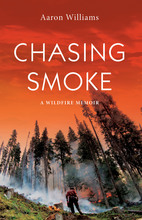
Chasing Smoke: A Wildfire Memoir
Review By Robert Scott
June 25, 2019
BC Studies no. 203 Autumn 2019 | p. 150-151
 Chasing Smoke is a memoir centered on Aaron Williams’ account of being a wildland firefighter in British Columbia during the 2014 fire season. Williams managed fire as a Telkwa Ranger, a wildland firefighter at the Telkwa Fire Attack Base, for nine consecutive fire seasons. The book is organized to chronicle the ninth. It contributes to the literature on the lived experience of wildland firefighting, which includes few publications about the job in British Columbia. In the front half, Williams primarily introduces the Telkwa Ranger unit crew, describes annual fitness tests, details training at ‘rookie week’ and in courses, and depicts the crew’s first fire. In the back half, Williams primarily discusses additional fires the crew helped manage. The book is composed of dialogue, inner monologue, and descriptive writing. There are no citations to other works. Yet it reveals much about life for wildland firefighters. They often work many hours in remote areas and interact with the same people for weeks at a time. They generally know much about local landscapes and how to manage fire on the landscapes. They sometimes have family connections in the wildland fire community. They judge each other’s abilities and behaviors. They influence, and are influenced by, crew cohesion, morale, and hierarchies. These are only a few examples which are contextualized in the book.
Chasing Smoke is a memoir centered on Aaron Williams’ account of being a wildland firefighter in British Columbia during the 2014 fire season. Williams managed fire as a Telkwa Ranger, a wildland firefighter at the Telkwa Fire Attack Base, for nine consecutive fire seasons. The book is organized to chronicle the ninth. It contributes to the literature on the lived experience of wildland firefighting, which includes few publications about the job in British Columbia. In the front half, Williams primarily introduces the Telkwa Ranger unit crew, describes annual fitness tests, details training at ‘rookie week’ and in courses, and depicts the crew’s first fire. In the back half, Williams primarily discusses additional fires the crew helped manage. The book is composed of dialogue, inner monologue, and descriptive writing. There are no citations to other works. Yet it reveals much about life for wildland firefighters. They often work many hours in remote areas and interact with the same people for weeks at a time. They generally know much about local landscapes and how to manage fire on the landscapes. They sometimes have family connections in the wildland fire community. They judge each other’s abilities and behaviors. They influence, and are influenced by, crew cohesion, morale, and hierarchies. These are only a few examples which are contextualized in the book.
Although Chasing Smokeis not a scholarly work in the sense that data was rigorously analyzed for scientific discovery, Williams’ account includes components that relate to themes in recent research about wildland firefighters. For example, many researchers propose arguments about how gender and sexuality are involved in being and becoming a wildland firefighter. Williams’ account includes ideas about being a man (e.g., 113/184) and toughness (e.g., 161), competitions and contests (e.g., 19/42/49/104/161), sexual fantasies and objectification (e.g., 86/99/100/128/129), and sexual discussions and jokes (e.g., 65/66/73/94/133/165/185). Researchers have used similar content to structure conceptualizations of wildland firefighter masculinity. Many have also engaged with the content critically. Williams does not.
Nonetheless, Williams provides a timely contribution to the mentioned literature. Although Chasing Smoke will offer little for people who study natural disasters or wildland firefighting, it may interest people who want to learn something about life for wildland firefighters in British Columbia. Despite why people read the book, though, they must not forget that it is greatly based on Williams’ perspective.
In concluding my review, I should mention some points about the writing in Chasing Smoke. I think the inclusion of a short chapter about how many fire seasons Williams was employed for and in what positions, the Telkwa Rangers and its crew positions, and British Columbia’s fire management program, including the types of crews in the province, would have strengthened the publication. Williams disperses some of this information in the book. In addition, I think readers who are unfamiliar with wildland fire management terminology may benefit from using a glossary of terms. The Canadian Interagency Forest Fire Centre offers a glossary online. Most terms in the book are described, but not all. Lastly, I think the writing quality is inconsistent. Sometimes the sentence and paragraph transitions could be stronger and occasionally frivolous detail is provided. Moreover, the writing seems forced at times. The latter is most apparent in the frequent use of analogies and similes. I make these points about quality because the publication can be classified as creative non-fiction. Such a genre demands great writing. This is not always achieved in the book. Even so, there are strong sections of writing through which Williams, a first-time book author, shows promise.
Publication Information
Chasing Smoke
Madeira Park, BC: Harbour Publishing, 2017. 192pp. $22.95, paperback.
